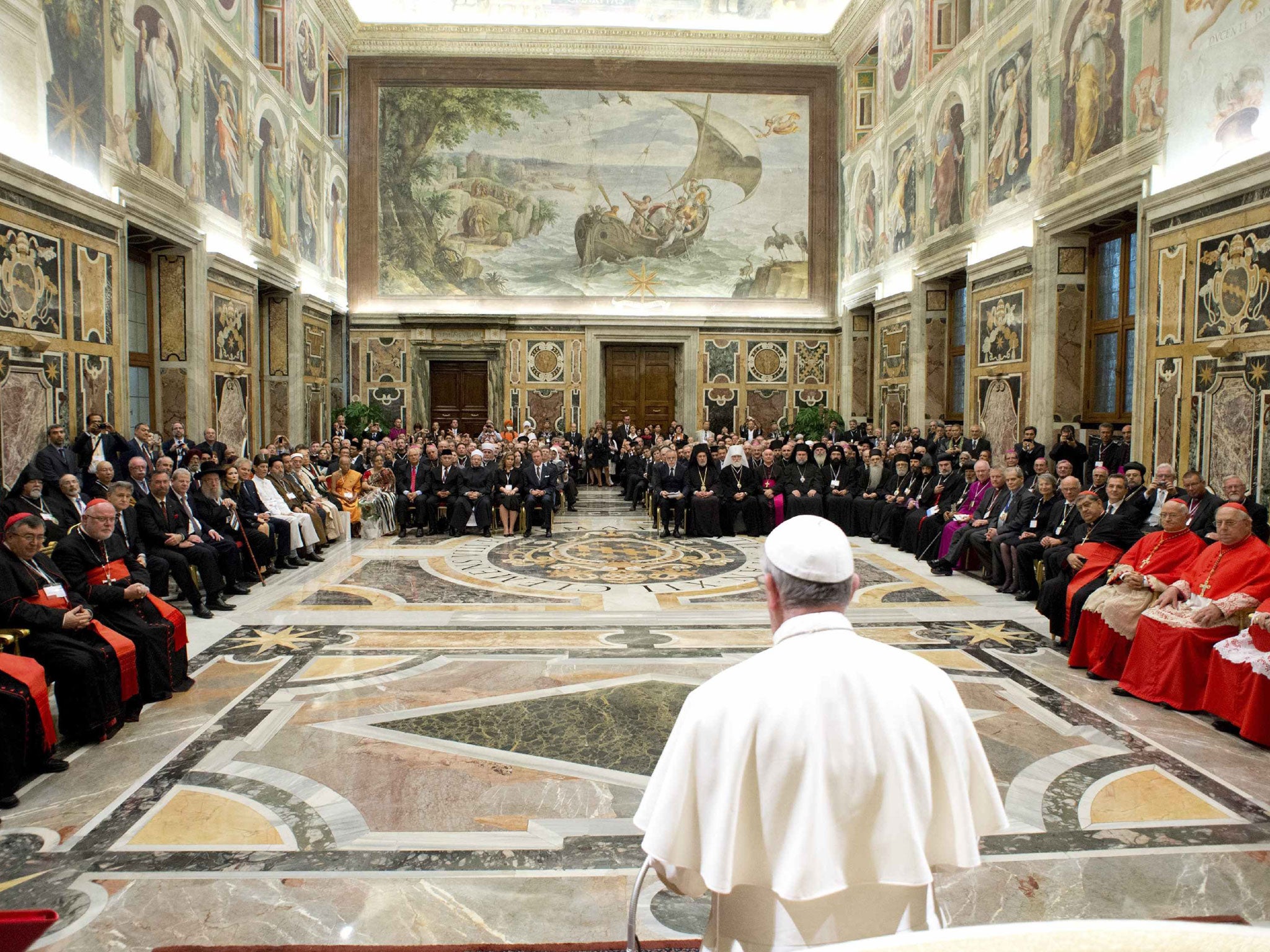Pope signals start of new war on Vatican corruption
Special audience with whistleblower seen as signalling bold crackdown on cronyism and graft in the Holy See

In a clear sign that he wants to be seen to be tackling endemic corruption at the Vatican, Pope Francis welcomed the Church’s highest-ranking whistleblower to a special audience today.
The Pontiff last night met Monsignor Carlo Maria Vigano, the Holy See’s ambassador to the US, whose letters provided the most explosive evidence to emerge from the Vatileaks scandal. Mgr Vigano’s correspondence with former Pope Benedict XVI and his No 2, the Vatican Secretary of State Tarcisio Bertone, suggested that he was effectively exiled in the US after attempting to lift the lid on rampant corruption in the Holy City.
Mgr Vigano served as the second-ranked administrator in the Curia – the body responsible for the administration of the Vatican – under Benedict’s reign, from July 2009 to September 2011, before his transfer to America.
His letters, leaked to the press by Benedict XVI’s butler, Paolo Gabriele, in the Vatileaks scandal, revealed how he had begged not to be transferred to the US after accusing fellow administrators of arranging corruption contracts that may have cost the Vatican millions of euros.
There has been no official comment from the Holy See about the audience, but the Ansa news agency said some Vatican insiders claimed the meeting marked the start of a new crackdown on cronyism and graft in the Holy City, including the activities of its troubled bank, the IOR (Institute of Religious Works).
Robert Mickens, the veteran Vatican correspondent of The Tablet, said: “Pope Francis is clearly taking the subject of corruption very seriously and he wants to clean up the IOR. This is a man who lives very simply. We already know what his thoughts on banks and bankers are.”
In May, in a major speech condemning materialism and avarice, Francis declared that the church “must go forward... with a heart of poverty, not a heart of investment or of a businessman”. St Peter, he said, “did not have a bank account”.
But even as Francis was meeting Mgr Vigano, the intrigues – real or imagined – in the Holy See, which senior officials have tried but failed to keep a lid on, were emerging again, after a national newspaper printed claims from another senior cleric that shadowy figures were plotting to poison him.
Monsignor Nunzio Scarano, who was arrested in June after magistrates found evidence he had tried to smuggle €20m (£17.3m) into Italy from Switzerland, told Libero newspaper he feared he would be killed for dishing the dirt on financial corruption in the Holy See.
‘’I have told of episodes that could put me in danger. I am trying to be stronger than the fear and nightmares that torment me, but despite my prayers, I am certain that I will die by poisoning,” he said. He is due to begin a fast-track trial on 3 December. Mgr Scarano’s lawyer has denied that the cleric laundered any money and said rich friends had given him funds to build a home for the terminally ill.
Magistrates believe, however, that Mgr Scarano, who owns a luxurious 700sq m flat in Naples, full of expensive art, used his two IOR accounts like overseas slush funds. Records show that on one occasion last year Mgr Scarano withdrew €560,000 from an IOR account in a single transaction. But more importantly, the affair highlighted once again the doubts over the transparency of transactions involving the IOR.
In June, investigators led by magistrates Giuseppe Pignatone, released a report on their 30-month investigation into the IOR. The document said that high demand for recycling cash, together with the lack of checks and controls by the IOR and the Italian financial institutions it dealt with, made the Vatican’s bank a money-laundering hot spot. Earlier this month it emerged that the IOR was seeking to close 900 suspicious accounts. According to Corriere della Sera newspaper, four of the suspect accounts are linked to the Vatican embassies of Indonesia, Iran, Iraq and Syria.
The Vatican announced further measures to beat money laundering on Monday this week.
Some people have dismissed Mgr Scarano’s claims of a poisoning plot as a Borgias-style fantasy. However, his statements made under interrogation have made ears prick up.
In particular, he is thought to be playing ball with magistrates by shedding a light on the murky workings of the other key financial institution in the Vatican, Apsa (Administration of the Patrimony of the Apostolic See), which administers the Holy City’s finances – and whose key figures benefit from IOR accounts.
One name keeps coming up: that of Paolo Mennini, who heads the division of Apsa that looks after the patrimony of the Holy See. He has been called the Pope’s merchant banker. Investigators are interested in cash flows totalling €230m from Apsa accounts to London banks between 2009 and 2011.
Lesus wept! Papal coins recalled after holy inappropriate mistake
Jesus might not have wept, but he wouldn’t have been pleased that his representatives on Earth were unable to spell his name.
The Vatican was forced to quickly withdraw 6,000 new papal medals on which Jesus’ name was spelt “Lesus”. But a handful of the coins, struck in gold, silver and bronze by the Italian mint, had already been snapped up, and will be worth a fortune.
The error was quickly picked up by social media users, as wags said: “Lesus Christ!”, “I blame the Lesuits” and “If only they had a spell check”.
The Vatican mints new coins when a new pope is elected and they provide significant income.
Join our commenting forum
Join thought-provoking conversations, follow other Independent readers and see their replies
Comments
Bookmark popover
Removed from bookmarks